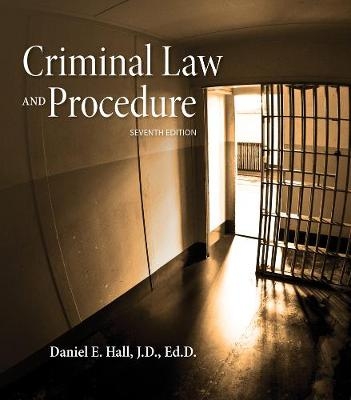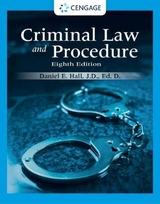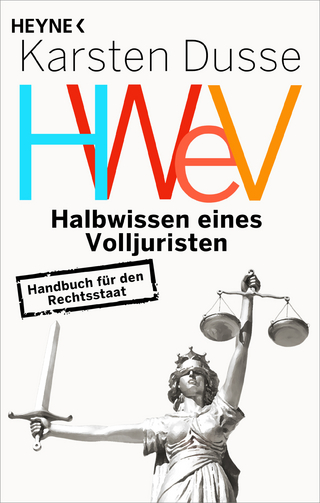
Criminal Law and Procedure
Delmar Cengage Learning (Verlag)
978-1-285-44881-7 (ISBN)
- Titel erscheint in neuer Auflage
- Artikel merken
CRIMINAL LAW AND PROCEDURE, 7th edition delivers extensive coverage of every aspect of the law and details the duties a paralegal is expected to perform when working within criminal law. High-level, comprehensive coverage is combined with cutting-edge developments, foundational concepts, and emerging trends, such as terrorism, treason, and national security crimes; cyber stalking; virtual child pornography; corporate crime, racial profiling, and more. Case excerpts help you develop your case analysis skills, while a variety of built-in learning aids sharpen your problem solving and analytical skills.
Daniel E. Hall has practiced law in both the United States and Federated States of Micronesia. He is professor and chair of the department of justice and community studies at Miami University where he is also professor of political science and affiliate professor of Black World Studies. He also holds the position of visiting professor of law at Sun Yat-sen University in Guangzhou, China. For nine years, Professor Hall was a member of the faculty in the department of criminal justice and legal studies at the University of Central Florida. He also served as chair of the department of criminal justice at The University of Toledo. A widely respected authority on public law, Professor Hall is the author of 21 textbooks (including subsequent editions) and a dozen journal articles on public law subjects. He earned his bachelor's degree at Indiana University, his Juris Doctor at Washburn University, and his Doctor of Education (higher education curriculum and instruction) at the University of Central Florida. Daniel E. Hall has practiced law in both the United States and Federated States of Micronesia. He is a professor of justice and community studies and political science at Miami University. He also holds the position of visiting professor of law at Sun Yat-sen University in Guangzhou, China. For nine years, Dr. Hall served as a member of the faculty in the department of criminal justice and legal studies at the University of Central Florida. He also served as chair of the department of criminal justice at The University of Toledo. A widely respected authority on public law, Dr. Hall has authored 27 textbooks (including subsequent editions) and a dozen journal articles addressing various public law subjects. He earned his bachelor's degree at Indiana University, his Juris Doctor at Washburn University and his Doctor of Education (higher education curriculum and instruction) at the University of Central Florida.
Part I: CRIMINAL LAW.
1. Introduction to the Legal System of the United States.
Federalism. Separation of Powers. The Structure of the Court System. Duties and Powers of the Judicial Branch. Comparing Civil Law and Criminal Law. The Authority of Government to Regulate Behavior. The Purposes of Punishing Criminal Law Violators. Specific and General Deterrence. Incapacitation. Rehabilitation. Retribution. Web Links. Key Terms. Review Questions. Problems & Critical Thinking Exercises. End Notes.
2. Introduction to Criminal Law.
The Distinction between Criminal Law and Criminal Procedure. Sources of Criminal Law. The Common Law. Statutory Law. Ordinances. Administrative Law. Court Rules. The Model Penal Code. Constitutional Law. Web Links. Key Terms. Review Questions. Problems & Critical Thinking Exercises. End Notes.
3. The Two Essential Elements.
Mens Rea. Mens Rea and the Common Law. Strict Liability. Vicarious Liability. Current Approaches to Mens Rea. Proving Mens Rea. Motive. Actus Reus. Voluntariness. Thoughts and Statements as Acts. Personal Status as an Act. Possession as an Act. Omissions as Acts. Causation. Web Links. Key Terms. Review Questions. Problems & Critical Thinking Exercises. End Notes.
4. Crimes Against the Person.
Studying Crimes. Homicide. Homicide and the Common Law. Statutory Approaches to Homicide. Manslaughter. The Model Penal Code Approach to Homicide. Life, Death, and Homicide. Suicide. Corpus Delicti. Assault and Battery. Aggravated Assault and Battery. Mayhem. Sex Crimes. Rape. Nonforcible Rape. Sodomy. Rape Shield Laws. Incest. Sex Offenses Against Children. Megan's Laws, Commitment, and Castration. Kidnapping and False Imprisonment. Kidnapping. Parental Kidnapping. False Imprisonment. Stalking. Civil Rights and Hate Crimes. Web Links. Key Terms. Review Questions. Problems & Critical Thinking Exercises. End Notes.
5. Crimes Against Property and Habitation.
Arson. Burglary. Theft Crimes. Introduction to Theft Crimes. Larceny. Embezzlement. False Pretenses. Receiving Stolen Property. Robbery. Extortion. Consolidated Theft Statutes. Identity Theft. The Model Penal Code Consolidation. Destruction of Property. Computer Crimes. Web Links. Key Terms. Review Questions. Problems & Critical Thinking Exercises. End Notes.
6. Crimes Against the Public.
Defining a Crime Against the Public." Crimes Against Public Morality. Prostitution and Solicitation. Deviate Sexual Conduct. Indecent Exposure and Lewdness. Obscenity. Regulating the Internet. Crimes Against the Public Order. Riot and Unlawful Assembly. Disturbing the Peace. Incitement/Advocacy of Unlawful Conduct. Threats. Vagrancy and Panhandling. Crimes Involving Firearms. Drug and Alcohol Crimes. Crimes Against the Administration of Government. Perjury. Bribery. Tax Crimes. Obstruction of Justice. Contempt. Crimes Against Sovereignty and Security. Treason. Sedition and Espionage. Terrorism. Crimes Against the Environment. Clean Water Act. Clean Air Act. Comprehensive Environmental Response, Compensation and Liability Act. Resource Conservation and Recovery Act. Occupational Safety and Health Act. Toxic Substances Control Act. Federal Insecticide, Fungicide, and Rodenticide Act. Emergency Planning and Community Right-to-Know Act. Endangered Species Act. Marine Mammal Protection Act. Web Links. Key Terms. Review Questions. Problems & Critical Thinking Exercises. End Notes.
7. Parties and Inchoate Offenses.
Parties to Crimes. Inchoate Crimes. Attempt. Conspiracy. Solicitation. Web Links. Key Terms. Review Questions. Problems & Critical Thinking Exercises. End Notes.
8. Factual and Statutory Defenses.
"Defense" Defined. Affirmative Defenses. Insanity. M'Naghten. Irresistible Impulse. Durham. The Model Penal Code Test. Guilty But Mentally Ill. Procedures of the Insanity Defense. Disposition of the Criminally Insane. Insanity at the Time of Trial. Duress and Necessity. Use-of-Force Defenses. Self-Defense. Defense of Others. Defense of Property and Habitation. Imperfect Self-Defense. Arrests. Infancy. Intoxication. Mistake. Entrapment. Alibi and Consent. Statutes of Limitation. Web Links. Key Terms. Review Questions. Problems & Critical Thinking Exercises. End Notes.
9. Constitutional Defenses.
Introduction. Double Jeopardy. Self-incrimination and Immunity. Due Process and Equal Protection. Vagueness and Overbreadth. Ex Post Facto and Bills of Attainder. First Amendment and Religion. First Amendment and Speech. Privacy and other Unenumerated Rights. Web Links. Key Terms. Review Questions. Problems & Critical Thinking Exercises. End Notes.
PART II: CRIMINAL PROCEDURE.
10. Introduction and Participants.
Criminal Procedure Defined. A Common-law, Adversarial, and Accusatorial System. The Due Process Model. The Participants. Law Enforcement Officers. Prosecutors. Judges. Defense Attorneys. Victims. Liability of Governments and Their Officials. Web Links. Key Terms. Review Questions. Problems & Critical Thinking Exercises. End Notes.
11. Constitutional Aspects of Criminal Procedure.
Introduction. Incorporation. Expansion of Rights. Exclusionary Rule. Fruit of the Poisonous Tree Exceptions. Standing. State Constitutions and the "New Federalism". Web Links. Key Terms. Review Questions. Problems & Critical Thinking Exercises. End Notes.
12. Searches, Seizures, and Arrests.
The Fourth Amendment. Privacy. Probable Cause. Searches and Seizures. The Warrant Requirement. Exceptions to the Search Warrant Requirement. Arrest. Defining Arrest. The Warrant Preference. Arrests in Protected Areas. Search Incident to Arrest and the Protective Sweep. Executing Arrest Warrants. Illegal Arrests. Analyzing Fourth Amendment Problems. Web Links. Key Terms. Review Questions. Problems & Critical Thinking Exercises. End Notes.
13. Interrogation and Other Law Enforcement Practices.
Interrogations, Confessions, and Admissions. Miranda. Sixth Amendment. Voluntariness Requirement. Electronic Surveillance. Governing Statutes. Wiretaps. Tracking Devices. Stored Communications and Subscriber Records. Pen Registers and Trap Devices. Pretrial Identification Procedures. Lineups and One-Man Showups. The Fairness Right. Photographs. Scientific Identification Procedures. Exclusion of Improper Identifications. Web Links. Key Terms. Review Questions. Problems & Critical Thinking Exercises. End Notes.
14. The Pretrial Process.
Introduction. Discovery and Investigation of Criminal Activity. Arrest. The Complaint. Initial Appearance. Pretrial Release and Detention. Types of Release. Eighth Amendment. Detention. Preliminary Hearing. The Formal Charge. Indictment and Grand Jury. Information. Arraignment. Pretrial Activity. Discovery. Motion Practice. Pretrial Conference. Extradition and Detainers. Removal. Web Links. Key Terms. Review Questions. Problems & Critical Thinking Exercises. End Notes.
15. Trial.
Trial Rights of Defendants. The Right to a Jury Trial. The Right to a Public Trial. The Right to Confrontation and Cross-Examination. The Presumption of Innocence/Burden of Proof. The Right to Speedy Trial. The Right to Counsel. Trial Procedure. Voir Dire. Preliminary Instructions. Opening Statements. The Prosecution's Case in Chief. The Defense Case. Rebuttal. Closing Arguments. Final Instructions. Jury Deliberations and Verdict. JNOV/New Trial. Web Links. Key Terms. Review Questions. Problems & Critical Thinking Exercises. End Notes.
16. Sentencing and Appeal.
Sentencing. Sentencing Procedure. Forms of Punishment. Habitual Offender Statutes. Postconviction Remedies. Appeal. Habeas Corpus. Web Links. Key Terms. Review Questions. Problems & Critical Thinking Exercises. End Notes.
Appendix A: The Constitution of the United States of America.
Appendix B: Selected Excerpts from the Model Penal Code.
Appendix C: Briefing and Analyzing Cases.
Glossary.
Index."
| Verlagsort | Clifton Park |
|---|---|
| Sprache | englisch |
| Maße | 210 x 240 mm |
| Gewicht | 1370 g |
| Themenwelt | Sachbuch/Ratgeber ► Beruf / Finanzen / Recht / Wirtschaft |
| Recht / Steuern ► EU / Internationales Recht | |
| Recht / Steuern ► Strafrecht | |
| ISBN-10 | 1-285-44881-2 / 1285448812 |
| ISBN-13 | 978-1-285-44881-7 / 9781285448817 |
| Zustand | Neuware |
| Haben Sie eine Frage zum Produkt? |
aus dem Bereich



